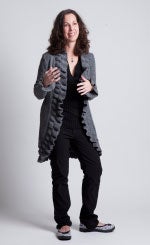Since 1998, Tracy Burkett has been opening students’ eyes to the complexities of the political process and its impact on society at large. We caught up with her to find out why she went into sociology, to see what advice she gives today’s students and to learn which sociologist she thinks we should all know.
How did you get interested in sociology? I signed up for a random class the last semester of my senior year of college just for the hours. It was a sociology course. The rest is history. When I see that professor at sociology conferences, I always remind her that her course sparked my interest.
Your dissertation looks at partnerships in the U.S. Senate. What was the big take-away? There was a precipitous decline in cooperation among senators starting in the early ’80s. Bipartisan cooperation and reciprocity decreased dramatically. Unfortunately, the gridlock we see in Congress today follows that trajectory very closely.
Which book has had the greatest impact on your career? There are so many, but C. Wright Mills’ The Power Elite (1955) is probably the most important. Mills examined the way that power is exercised in the United States and provided a convincing alternative to pluralistic models of power.
On the flip side, what’s your favorite book? It’s hard to pick just one! I would rank Hunter S. Thompson’s Fear and Loathing: On the Campaign Trail ’72 as one of my favorites. I just reread it during the 2012 election season, and it was as relevant as ever.
What’s cool about being a sociologist? I’m not sure that sociologist and cool belong in the same sentence. I think it’s cool to keep up with former majors who are happily employed in so many fields, including medicine, law, academics, business, social work and education.
What’s the most important lesson your students can learn in your political sociology course? The electoral process that the average citizen engages in is only a small part of the political process. Special interests, policy making and agenda setting are probably more important, but these are largely invisible. If students go away from my class appreciating something of these processes, I am happy.
What’s your favorite lesson to teach? While largely invisible to us, social forces impact us every day in every aspect of our lives. Even our most personal choices – what we name our children, what careers we choose, whom we marry, how we express our emotions – are shaped by our society and our positions in society. Sometimes I title this, “Why there are three Brittanys in this class.”
Best college advice? Read the syllabus. Go to class. Know your professors. Have fun (but not too much).
Biggest pet peeve when it comes to students? I can’t stand to get emails, “I missed class. Did we do anything?” Of course we did something!
What’s your favorite comfort food? I love Southern-style baked macaroni and cheese. It reminds me of meals at my grandmother’s table.
How would you describe your teaching style? It depends on the course, but I try to get students engaged in the learning process. An average class meeting will probably include some lecture, but also discussion and meaningful input from students.
If you could do any other job, what would it be? I worked for newspapers during and after college. On the whole, I think the media do a mediocre job translating and disseminating social science research to the masses, so perhaps I would try writing again.
How do you blow off steam? Reading, gardening, exercising, listening to music.
What’s the last album you’ve purchased? Babel by Mumford & Sons.
What’s one class that every college student should take? Intro to Sociology, of course! The sociological perspective allows one to understand the connections and dynamics between individuals, groups and society. This is useful no matter what your major or interests.
What’s your next big research topic? I’m switching gears a bit. While I was directing the minor in environmental studies, a group of students pulled me into the urban garden and sustainable agriculture scene. I’m now looking at the relationship of community gardening and agricultural networks with community well-being.
What’s the most interesting thing in your office? I have a shelf of toys and art supplies. My daughters are frequent visitors to my office, and I try to keep them busy. My college students often pull out the toys (especially the Legos) while we’re chatting.
Who’s one sociologist everyone should know? Maybe I should mention one of the classic sociological thinkers like Emile Durkheim or Max Weber, but since I’m answering this close to MLK Day, I’m going to go with Rev. Martin Luther King Jr. As an undergraduate, King majored in sociology. I think the sociological perspective comes through loud and clear in his writing and speeches.
What’s been your best moment as a professor at the College? Getting to assist in awarding my youngest brother, Scott, his degree during spring graduation on Mother’s Day 2002. We started here the same semester, I as an assistant professor and he as a freshman.






